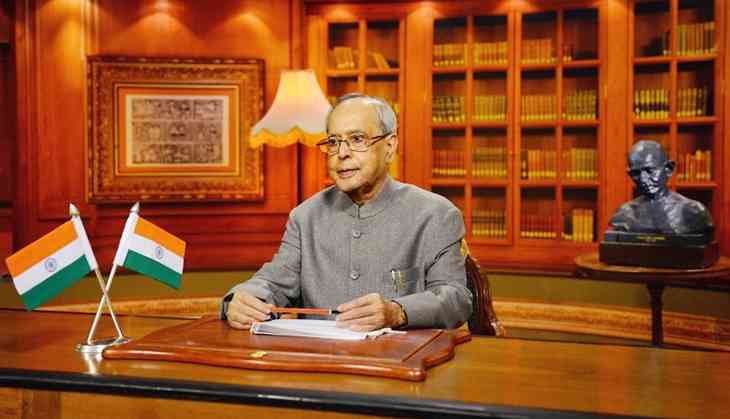
At his farewell speech, President Pranab Mukherjee summed up his tenure by saying, “I strived to preserve, protect and defend our Constitution, not just in word but also in spirit.” It is no more than what Article 60 of the Indian Constitution enjoins the President of India to do by his oath of office.
Mukherjee may have been a copybook President. But his tenure suffered from one major failing – an inability to reach out to the Kashmiri people when they needed his wisdom and compassion the most. In the aftermath of the violence that ensued in the summer of 2016, when civilians were killed in violence and pellet guns blinded many including teenage children, President Mukherjee did not speak out.
As the guardian of the Constitution and the rights it bestows upon the people, the President chose silence despite being urged by many to speak up.
He last spoke against violence in Kashmir in 2012 at the 18th Annual Convocation of the University of Kashmir. After that it seems to have disappeared from his mental map.
At the 2012 convocation, he advised Kashmiri youth to partake of the enormous opportunities that India offered.
He told youngsters, “No problems are ever resolved by violence. It only aggravates the pain and the hurt on every side. The healing process must be nurtured with love, compassion and patience."
He further acknowledged the problems in Kashmir saying, “I am aware that there are grievances. Many important issues need deft handling and speedy resolution. The Government of India and the Government of Jammu and Kashmir are determined to ensure that every Kashmiri lives with dignity having equal rights and equal opportunities."
This is how the President of India is expected to speak.
However, after Narendra Modi’s prime ministership in 2014, the President has preferred silence on Kashmir. Even when more than a 100 people died, more than 14,000 civilians were injured and more than a hundred lost their eyesight fully or partially due to pellet guns, the President nowhere urged the government to protect the life and liberty of India’s citizens in Kashmir.
The President could not have been in the dark about what was happening on the ground in Kashmir with the pervasive coverage by television and the print media and every little incident amplified by social media. Above all, because delegations of politicians and concerned citizens met the President and briefed him independently about the situation in Kashmir.
After 43 days of continuing violence, on 20 August, 2016 a delegation of Opposition leaders from Jammu and Kashmir led by Omar Abdullah met President Pranab Mukherjee in Delhi. They briefed him on the “worsening situation” in the Valley and urged him to use his influence on the state government as well as the Centre to stop using lethal force against civilians. They also wanted him to advise the Centre to use political – as opposed to administrative – means to address the issue.
In December last year, veteran politician Yashwant Sinha briefed the President along with some concerned citizens who had visited Kashmir twice to listen to the Kashmiri people and their woes. At that meeting, a request was made to President Mukherjee that he might consider reaching out to the Kashmiri people in broad terms – sharing their pain and expressing sorrow over civilian deaths in violence.
President Mukherjee readily agreed and volunteered to do so in one of his speeches before the Republic Day, 26 January, 2017. The Yashwant Sinha group suggested a few lines which the President may then consider using in in one of his speeches. President Mukherjee readily agreed to this. Everyone present was impressed by the sensitiveness shown by the President.
After much discussion among the group members, the following draft was sent to the President’s Press Secretary:
“Kashmir has been in a state of unrest for the past several months. It has resulted in the death of nearly a hundred people while many more have been injured.
“My heart goes to the families of those who have suffered the loss of their near and dear ones and to the scores of youth who have lost their vision.
“I can feel the pain of my brothers and sisters in Kashmir.
“As a nation we need to do everything possible to assuage the pain and suffering of the people of Jammu and Kashmir even as we cannot undo their loss.
“Only bonds of love and understanding will bind India together. We must strive to create a peaceful and humane environment in the country as that alone can meet the aspirations of all our citizens.”
This was unexceptional language by all accounts. It did not dictate policy to the Executive nor did it criticize the government’s Kashmir policy. It did not go into the causes of the violence in Kashmir which could be a matter of debate. Its only objective was to show the empathy of the First Citizen of India towards his fellow citizens at a time of grief.
All delegations who met the President, were hopeful that the President by reaching out to the Kashmiris would have a tremendous positive impact on the Kashmiri psyche.
Intriguingly, President Pranab Mukerjee at the fag-end of his career did not choose to say a thing about the developments in Kashmir. His inability to rise to occassion to reach out to the Kashmiris is likely to be a blemish on his legacy.



